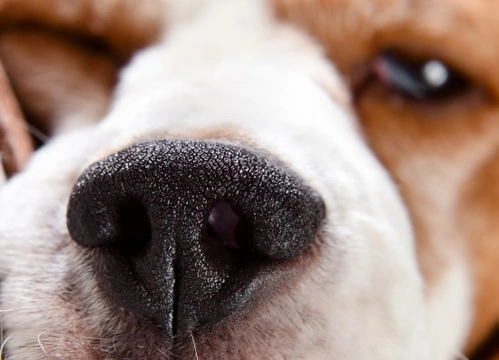
Can dogs lose their sense of smell?
The dog’s sense of smell is their keenest sense, and the one that they rely upon most heavily. While losing the senses of sight or hearing will of course handicap any dog in certain ways, the loss of their sense of smell, or a reduction in its keenness, is much more likely to have a profound effect on the dog, and how well they are able to navigate the world and deal with its challenges.
However, as dogs age, their sense of smell will tend to become less keen, and other issues can also cause either a temporary or permanent reduction in the dog’s sense of smell. So, how does this happen and what does it mean for dogs? Read on to find out.
The nose knows...
While having a wet nose is not normal for people, and is likely to indicate ill health or another irritation, for the dog, a wet nose is greatly beneficial in aiding their sense of smell.
The surface of the nose itself, both internally and externally, are rich with scent receptors, which allow your dog to receive and decode smells around them. Mucous membranes help to capture and preserve scents, and in order to do this, they need to be moist. So a wet nose in the dog actually assists with their sense of smell, and temporary dryness of the nose will greatly hamper the dog’s ability to scent properly. If your dog is sniffing around or thinks that they have identified a particularly interesting smell, you might well see them lick their nose, in order to improve their ability to pick up and understand the scents around them.
Dogs generally sniff shallowly, and when they exhale, the scents that they have picked up are lost. This allows dogs to concentrate on the now of the current smell palate, and not retain so many smells and so much stimulus that individual scents get lost in the crowd.
Dogs that are tired or overheating will pant to cool themselves down, and this actually hampers the sense of smell for the duration. Scents are quickly expelled by the exhalations, and the nose will usually be rather dry, all of which means that any given dog’s sense of smell will be up to 40% compromised while they are panting to cool down or to try to get their breath back.
Allergies and infections
A great number of external factors can also interfere with the dog’s ability to scent, including infections such as coughs ad colds, or allergies to things like pollen.
Allergenic compounds can mask scents and interfere with the dog’s ability to decode the scents that they do receive, while illnesses such as colds, sinusitis or coughs all go a great way towards blocking your dog’s ability to inhale scents at all.
While all dogs are apt to contract the odd minor ill or cold from time to time, it is vital to get them checked out by your vet if the condition is serious, prolonged, or appears to be greatly annoying your dog. Excessive panting, mucous production and irritations that lead to sneezing not only affect your dog’s sense of smell in the short term, but left unchecked, can lead to permanent damage and loss of scenting ability in the affected dog.
Age-related loss of scenting ability
When dogs age, their bodies and minds will naturally begin the slow decline of the body’s process of shutting down towards the end of their lives. This will manifest in a whole range of ways, such as less acute hearing and vision, the sense of taste fading, and also, a gradual decrease in the acuity of the dog’s sense of smell.
Dogs very rarely totally lose their sense of smell, particularly as part of the aging process. However, the sense of smell in the dog does begin to decline slowly from the onset of maturity, at the age of around seven or eight onwards. This, along with the slow loss of physical condition, is why working dogs that rely upon their superior sense of smell are usually retired relatively young, while they still have a great many healthy years ahead of them.
It can be difficult for the dog owner to realise that their dog is losing their sense of smell, as loss of this particular sense is not something that we commonly pay a lot of attention to. Your dog is unlikely to change in their obvious behaviour where scenting is concerned, and will almost certainly still very much enjoy sniffing around and looking for trails.
However, one of the most obvious indications of the decline of the sense of smell in the dog is if your dog does not seem to be as enthusiastic about their normal meals as they used to be, but clamours for very strongly smelling foods that you might be cooking instead.
As the senses of taste and smell are so closely intertwined, particularly in dogs, this is often one of the first indications that the sense of smell is on the wane.



